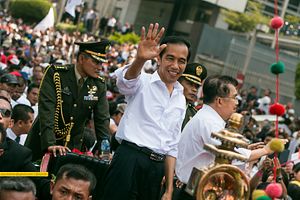On May 3, an agreement was reached in Indonesia between a national finance company and state-owned defense companies that would facilitate additional financial support for these firms. The conclusion of the agreement once again put the spotlight on Indonesia’s ongoing attempts to strengthen its defense industry under Indonesian President Joko “Jokowi” Widodo.
As I have noted previously in these pages, in recent years, Indonesia has signaled its determination to build up the country’s domestic defense industry for a whole range of reasons, from boosting its self-sufficiency to contributing to the country’s economic prosperity. Though the importance of this goal was understood before as well, it really began taking off under the tenure of former President Susilo Bambang Yudhoyono, and has continued on under Jokowi (See: “An Indonesian Defense Revolution Under Jokowi?”)
Indeed, since coming to office in 2014, Jokowi has clearly signaled a multi-pronged approach to strengthening Indonesia’s defense industry from the outset of his presidency, from the transfer of technology to improving the management of state-owned defense companies. As I have noted repeatedly in these pages, though significant challenges remain, the objective continues to be advanced into 2018 (See: “Indonesia Spotlights Defense Industry Challenge Under Jokowi”).
Last week, in another related development, an agreement was publicly signed between a national finance company and local, state-owned defense companies. The memorandum of understanding (MOU), which was inked on May 3 at the Indonesian defense ministry between PT Askrindo (Persero) and the National Association of Private Defense Industries (Pinhantanas), is expected to facilitate the provision of expanded financial support that would enable these firms to advance their activities at home and abroad.
In a statement, the Indonesian defense ministry said that the forms of support provided for the Indonesian defense industry would include bank guarantees, credit, and insurance. Indonesian defense minister Ryamizard Ryacudu, who attended the signing, said in his remarks that the signing of the agreement represented the trilateral synergy between the Indonesian defense ministry, state-owned defense companies, and national finance institutions in building up the country’s defense industry and its military capabilities more generally.
The extent to which this support will actually facilitate the strengthening of the Indonesian defense industry, however, remains to be seen. As I have noted previously, though efforts in this respect are notable and are continuing under Jokowi, they have also unsurprisingly been playing out much slower than intended. And while the sorts of financial support that this MOU could be a help, getting that trilateral synergy Ryacudu mentioned is much more difficult in reality than in rhetoric. Furthermore, though the lack of such support is no doubt a challenge for Indonesia’s defense industry, there are also other more serious ones as well – from the competitiveness of products to corruption and inefficiency – that will need to be addressed as well.































